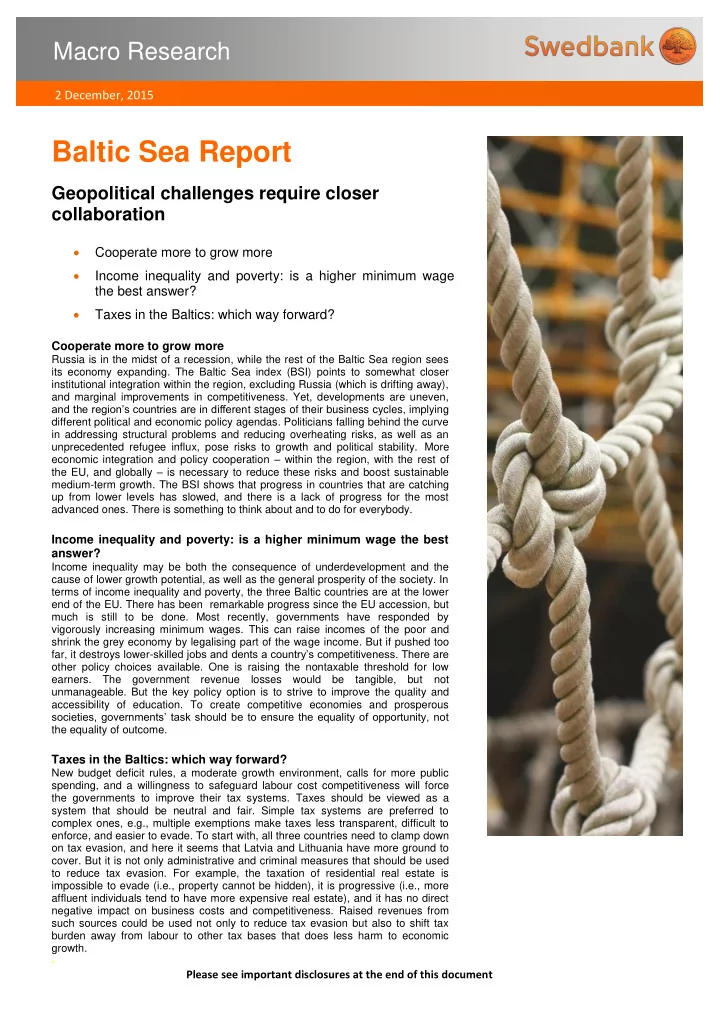

Macro Research Macro Research - Baltic Sea Report 2 December, 2015 Baltic Sea Report Geopolitical challenges require closer collaboration Cooperate more to grow more Income inequality and poverty: is a higher minimum wage the best answer? Taxes in the Baltics: which way forward? Cooperate more to grow more Russia is in the midst of a recession, while the rest of the Baltic Sea region sees its economy expanding. The Baltic Sea index (BSI) points to somewhat closer institutional integration within the region, excluding Russia (which is drifting away), and marginal improvements in competitiveness. Yet, developments are uneven, and the region’s countries are in differen t stages of their business cycles, implying different political and economic policy agendas. Politicians falling behind the curve in addressing structural problems and reducing overheating risks, as well as an unprecedented refugee influx, pose risks to growth and political stability. More economic integration and policy cooperation – within the region, with the rest of the EU, and globally – is necessary to reduce these risks and boost sustainable medium-term growth. The BSI shows that progress in countries that are catching up from lower levels has slowed, and there is a lack of progress for the most advanced ones. There is something to think about and to do for everybody. Income inequality and poverty: is a higher minimum wage the best answer? Income inequality may be both the consequence of underdevelopment and the cause of lower growth potential, as well as the general prosperity of the society. In terms of income inequality and poverty, the three Baltic countries are at the lower end of the EU. There has been remarkable progress since the EU accession, but much is still to be done. Most recently, governments have responded by vigorously increasing minimum wages. This can raise incomes of the poor and shrink the grey economy by legalising part of the wage income. But if pushed too far, it destroys lower- skilled jobs and dents a country’s competitiveness. There are other policy choices available. One is raising the nontaxable threshold for low earners. The government revenue losses would be tangible, but not unmanageable. But the key policy option is to strive to improve the quality and accessibility of education. To create competitive economies and prosperous societies, governments’ task should be to ensure the equality of opportunity, not the equality of outcome. Taxes in the Baltics: which way forward? New budget deficit rules, a moderate growth environment, calls for more public spending, and a willingness to safeguard labour cost competitiveness will force the governments to improve their tax systems. Taxes should be viewed as a system that should be neutral and fair. Simple tax systems are preferred to complex ones, e.g., multiple exemptions make taxes less transparent, difficult to enforce, and easier to evade. To start with, all three countries need to clamp down on tax evasion, and here it seems that Latvia and Lithuania have more ground to cover. But it is not only administrative and criminal measures that should be used to reduce tax evasion. For example, the taxation of residential real estate is impossible to evade (i.e., property cannot be hidden), it is progressive (i.e., more affluent individuals tend to have more expensive real estate), and it has no direct negative impact on business costs and competitiveness. Raised revenues from such sources could be used not only to reduce tax evasion but also to shift tax burden away from labour to other tax bases that does less harm to economic growth. . Please see important disclosures at the end of this document December 2, 2015 Please see important disclosures at the end of this document Page 1 of 31
Macro Research - Baltic Sea Report The Baltic Sea region and Swedbank Baltic Sea index 2015 The aim of the Baltic Sea Report is to assess the structural quality and strength of the Baltic Sea region economies from the point of the legal and business environment, and to provide analysis and suggest possible interventions by policymakers to support the swift and sustainable growth of their economies. The region includes 10 countries around the Baltic Sea: Germany, Denmark, Norway, Sweden, Finland, Russia, Estonia, Latvia, Lithuania, and Poland. Detailed analysis is provided for Swedbank’s four home markets: Sweden, Estonia, Latvia, and Lithuania. Contents Introduction: cooperate more to grow more ............................................................... 3 Sweden: Growth boost from migration .................................................................. 7 Estonia: where’s a pit stop? ................................................................................ 10 Latvia: policymakers, move on ............................................................................ 13 Lithuania: aging society, lagging reforms ............................................................ 16 Income inequality and poverty: is a higher minimum wage the best answer? .... 19 Taxes in the Baltics: which way forward? ........................................................... 23 Appendix: Swedbank Baltic Sea Index................................................................ 27 December 2, 2015 Please see important disclosures at the end of this document Page 2 of 31
Recommend
More recommend